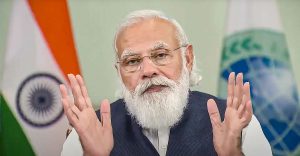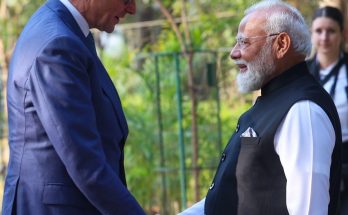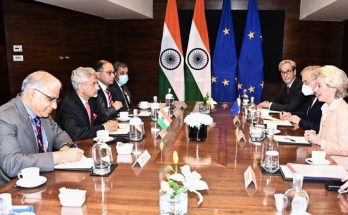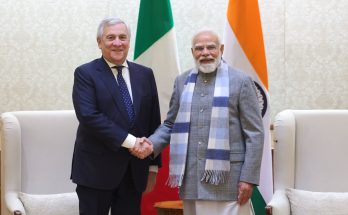By Shweta Aggarwal

DUSHANBE/NEW DELHI: In pointed remarks aimed at the Taliban, Prime Minister Narendra Modi singled out radicalisation as the biggest threat to the region and exhorted the nine-nation SCO to forge a template to combat extremism.
“I believe that the biggest challenges in this area are related to peace, security and trust-deficit and the root cause of these problems is increasing radicalization,” said PM Modi in his virtual address at the SCO summit being held in Tashkent on September 17. “Recent developments in Afghanistan have made this challenge more apparent. SCO should take an initiative on this issue,” he said.
Taliban versus Sufism
“The 20th anniversary of the SCO is also a suitable occasion to think about the future of the SCO. If we look at the history, we will find that the region of Central Asia has been a bastion of moderate and progressive cultures and values,” said Modi in an oblique critique of the Sunni Wahhabi Islam practised by the Taliban.
As a counter to the Taliban’s brand of hardline Islam, PM Modi invoked the culture of Sufism in the region. “Traditions like Sufism have flourished here over the centuries and spread throughout the region and the world. We can still see their influence in the cultural heritage of this region,” he said. “On the basis of this historical heritage of Central Asia, SCO should develop a common template to fight radicalization and extremism,” he said.
Mr Modi alluded to the presence of “moderate, tolerant and inclusive institutions and traditions associated with Islam” and exhorted the SCO to develop a strong network between these institutions. Linking economic prosperity of the region with effectively combating radicalisation, Mr Modi underlined that “the vast economic potential of this region has also remained untapped due to radicalization and insecurity, be it mineral wealth or intra-SCO trade.”
“PM Modi’s speech at the SCO summit is a trenchant critique of the Taliban brand of Islamic that terrorises people from other faiths and tramples on the rights of women. In his speech, PM Modi has invoked the syncretic multi-faith culture and the spirit of Sufism in the region to counter the Taliban fundamentalism,” said Manish Chand, CEO & Editor-in-Chief, India Writes Network and India and the World magazine.
“PM Modi’s speech is an exhortation to all the countries in the region to adhere to the spirit of inclusive Islam that forms the predominant culture of the region,” said Mr Chand.
Author Profile
- India Writes Network (www.indiawrites.org) is an emerging think tank and a media-publishing company focused on international affairs & the India Story. Centre for Global India Insights is the research arm of India Writes Network. To subscribe to India and the World, write to editor@indiawrites.org. A venture of TGII Media Private Limited, a leading media, publishing and consultancy company, IWN has carved a niche for balanced and exhaustive reporting and analysis of international affairs. Eminent personalities, politicians, diplomats, authors, strategy gurus and news-makers have contributed to India Writes Network, as also “India and the World,” a magazine focused on global affairs.
Latest entries
 DiplomacyJanuary 5, 2026India walks diplomatic tightrope over US operation in Venezuela
DiplomacyJanuary 5, 2026India walks diplomatic tightrope over US operation in Venezuela India and the WorldNovember 26, 2025G20@20: Africa’s Moment – The Once and Future World Order
India and the WorldNovember 26, 2025G20@20: Africa’s Moment – The Once and Future World Order DiplomacyOctober 4, 2025UNGA Resolution 2758 Must Not Be Distorted, One-China Principle Brooks No Challenge
DiplomacyOctober 4, 2025UNGA Resolution 2758 Must Not Be Distorted, One-China Principle Brooks No Challenge India and the WorldJuly 26, 2025MPs, diplomats laud Operation Sindoor, call for national unity to combat Pakistan-sponsored terror
India and the WorldJuly 26, 2025MPs, diplomats laud Operation Sindoor, call for national unity to combat Pakistan-sponsored terror







